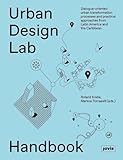Urban design lab handbook: dialogue-oriented urban transformation processes and practical approaches from Latin America and the Caribbean Roland Krebs
Tipo de material: TextoIdioma: Inglés Detalles de publicación: Berlin Jovis 2019Edición: 1a edDescripción: 363p. 27 cmISBN:
TextoIdioma: Inglés Detalles de publicación: Berlin Jovis 2019Edición: 1a edDescripción: 363p. 27 cmISBN: - 9783868595628
- 22 711.4 K731
| Tipo de ítem | Biblioteca actual | Signatura topográfica | Copia número | Estado | Fecha de vencimiento | Código de barras | |
|---|---|---|---|---|---|---|---|
| Libro Nuevas Adquisiciones | Campus Armenia Campus Armenia | 711.4 K731 (Navegar estantería(Abre debajo)) | 1 | Disponible | L035721 |
Urban Design Lab Handbook - Dialogue-Oriented Urban Transformation Processes and Practical Approaches from Latin America and the Caribbean Between 2013 and 2018, the Institute of Urban Design and Landscape Architecture of TU Wien partnered with the Housing and Urban evelopment Division (HUD) of the Inter-American Development Bank (IDB) to create a scientific foundation for innovative methods that foster participatory urban planning and design. An experimental design approach was applied, combining people- centered planning, participatory planning tools, urban strategies, and urban design. The Urban Design Lab (UDL) worked in over twenty emerging cities in Latin America andthe Caribbean (LAC).
The “Urban Design Lab Handbook” displays the result of a five years planning process: not only 21 projects all over the American continent were developed, but also an outstanding planning methodology was elaborated. The handbook explains the context and emerging problems faced by the cities of Latin America and the Caribbean and puts forward various solutions for typical difficulties encountered within those urban conglomerations. Latin America and the Caribbean constitutes the second most urbanized region on the planet and LAC cities are growing exponentially. In order to face the resulting challenges, long-term strategies need to be developed, dealing with urban phenomena such as: rapid population growth, informal settlements, the revival and regeneration of centrally located—but neglected—spaces, as well as with urban management and governance issues similar to those found in other expanding agglomerations. These strategies need to address major questions: How can one plan a growing city without neglecting urbanity? How can one manage urban spatial growth in tandem with social, environmental, cultural and economic challenges?

